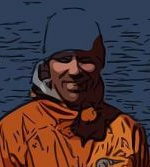This episode of Teachers Teaching Teachers started a couple of weeks ago on Google+. Here's the story of why we invited anthropologist Peter D. Little to join us in our planning for classes this fall.
It started when I (Paul Allison) asked a couple of questions after reading about a meeting in Rome, where the international community rallied "to the aid of drought- and famine-affected populations in the Horn of Africa with an immediate, twin-track programme designed to avert an imminent humanitarian catastrophe and build long-term food security in the region" (The Standard, 07/25/2011). I wanted to learn more about what was happening on the Horn of Africa, and so I ventured forth by quoting a couple of paragraphs from this article, and by asking a couple of questions.
These two paragraphs leave me with a lot of questions. The notion of a pastoralist is new. I want to learn more about these livestock owners who travel from place to place. How does that work? And the notion of "agropastoralists" seems to imply that they also do farming, which would mean that they move less often. How do these people work in Somalia and other countries? Are they in one ethnic group? Is the famine affecting these folks? Can they provide long-term solutions?
Soon after I posted this, and some back and forth had begun, we received this note from Kris Jacobson, a high school librarian who is interested in learning, libraries, education, professional wrestling, news and politics:
I'm glad that the proposed solutions include letting agropastoralists & pastoralists maintain their nomadic way of life and their animals. Development specialists should not be in the habit of trying to make people abandon their cultures and economies. If you're interested in East African pastoralists, Peter D. Little is one of the top researchers in the field:
http://esciencecommons.blogspot.com/2011/07/what-we-can-learn-from-african.html
What a wonderful lead this turned out to be into my ongoing inquiry into the Horn of Africa as we plan curriculum together for this fall. With a hat tip to Kris Jacoboson, I continued to read and to write on Google+ about what I to what I was learning:
Thanks to +Kris Jacobson I've just been educated on the pastoralists in the Horn of Africa. Carol Clark writes with knowledge and clarity about the the pastoralists, whose lives, Professor Peter Little has been documenting for some time. As he writes:
During the past 27 years, my research has addressed the anthropology of development and globalization, political economy of agrarian change, pastoralism, environmental politics and change, informal economies and statelessness, and food insecurity in several African countries. Most of my field studies have been conducted in Africa, with a primary emphasis on eastern Africa (Kenya, Somalia, and Ethiopia).
I was off and running, inspired because I had a frame to work with. I followed up by reading a couple of studies and a chapter in a book by Peter Little, and I found that his voice was echoing in my head, with hope in local solutions in Somalia. At least librarian Kris Jacobson and the writer of the Emory University blog, Carol Clark had sent me through Peter Little on a quest to find what local knowledge and indigenous culture and industry and agriculture there might be in Somalia and Ethiopia and Kenya and the rest of the Horn of Africa. How are the people there dealing with the droughts and what's preventing them from finding their own solutions? I began to ask.
As my inquiry continued, I found myself wondering, "What would Peter Little say?" His work had provided for me a perspective, perhaps a conscience as I have been reading (and writing) about the complex, ever-developing issues surrounding the famine.
And so, we asked him to come on Teachers Teaching Teachers to guide us toward the questions we might be asking our students, to wonder what approaches he will be taking this fall himself, and to dialogue with him about the famine that we are facing on the Horn of Africa.
Thanks also for our other thoughtful guests, Shannon Sullivan who developed curriculum for PBS, Chris Sloan, Zac Chase, and Adam Cohen.
Click Read more to see a copy of the chat that was happening during the webcast.

 and sometimes publish the results online?
and sometimes publish the results online? on the show in the hallways of the
on the show in the hallways of the 
